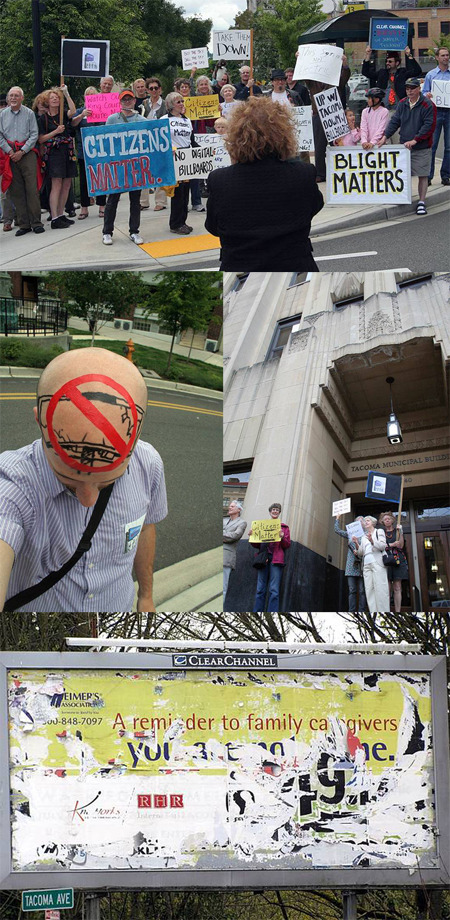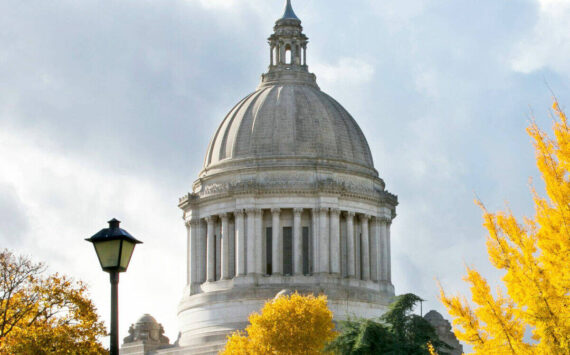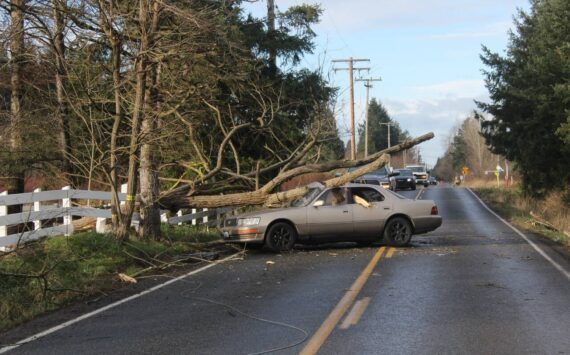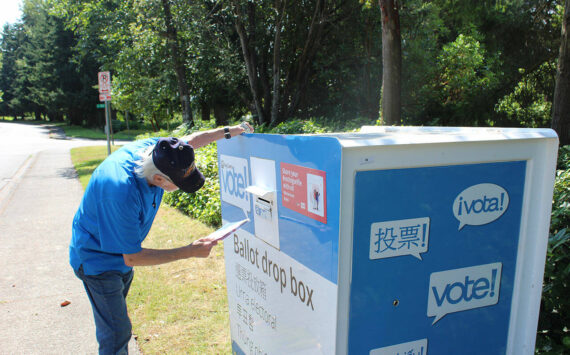Tacoma City Council approved an ordinance Tuesday that adopts the findings of Tacoma’s planning commission supporting a billboard moratorium and amends the moratorium to exempt vested applications for billboard application permits as well as current applications to repair existing billboards in order to meet state and federal safety standards.
On May 17, City Council unanimously approved a six-month moratorium on constructing new billboards and modifying existing billboards within the city limits. The decision was the latest chapter of an issue that has dated back to 1997, when the city approved a billboard ordinance aimed to do away with what the city determined to be the biggest, ugliest, and most disruptive billboards by Aug. 1, 2007. A decade later and shortly before the ordinance went into effect, Clear Channel sued the City of Tacoma and claimed its rights to free speech were violated. Last year, City Council agreed to a settlement with Clear Channel that allowed 38 new digital billboards to be built in exchange for removing 253 existing billboards and relinquishing the permits for 169 other billboards. Tacoma’s planning commission, however, received overwhelming input from Tacoma residents who opposed the agreement and urged the city to stand by its original billboard ordinance. Hence, the billboard moratorium.
City Council is expected to finalize a new billboard ordinance later this year.
Hours before the city council meeting, Tacoma’s Central Neighborhood Council submitted 1,400 signatures in opposition to digital billboards to the City Clerk’s office. That was followed by a rally outside City Hall, and a long public hearing during council’s meeting.
Many people both for and against the billboard moratorium spoke during the hearing. Here are some of their comments.
Bill Baarsma, former Tacoma mayor
I’m here really to defend the actions of the 1997 City Council regarding the position we took on billboards at that time. This was a precursor to what is happening here this evening. Brian Ebersole, who was the mayor at the time, took the lead on the issue of billboards. As a matter of fact, he took this issue all the way to the U. S. Conference of Mayors, where the City of Tacoma received strong support throughout the country in the position that we were taking. We see, once again, mayors from major cities throughout the country addressing this particular issue. At the time, it wasn’t digital, but this issue is now being addressed in the same manner. As a councilmember at that time, I was the strongest supporter of the mayor on this issue and it seems like deja vu again this evening because back in 1997 we had public hearings, the chambers were packed, voices were raised, it was tense. There was finger-wagging and threats to sue the city. I’ve got to say, for the record, Clear Channel was not a part of that discussion at that time, but much of the discussion was the same as we’re seeing here this evening. Our position in 1997 was to ban obtrusive, invasive and unsightly billboards in residential or sensitive areas of the city. It was a quality of life issue for us. Now, we wanted to ban billboards outright. We could not without paying for the value of that. It was burdensome. So we chose to move into an amortization process of 10 years. We asked our city attorneys at that time [that] we want[ed] an ordinance that’s air-tight legally, that’s based on legal precedence so that when the 10 years elapsed we would be in a position to take the appropriate action necessary. The discussion was re-opened in 2007 when I was mayor and, as I recall, the city manager at that time brought a number of alternatives to the table that we were going to engage in discussions with Clear Channel. I do not recall us ever discussing mega-billboards that are currently being — additional billboards that are being discussed. I’m here really to support the position of the planning commission. I trust their judgment. They’re acting clearly in the public interest. They’re charged to protect our quality of life and the interest of the City of Tacoma, and I hope that this body will support the planning commission in the recommendation.
Myrle Carner, law enforcement officer
I am a 40-year veteran of the Seattle Police Department. I’d like to give you a law enforcement perspective of digital signage. I am also the regional director of what we call Crime Stoppers of Puget Sound and we partner with Tacoma-Pierce County Crime Stoppers. Crime Stoppers and local police departments like to look at what’s best in what we call public-private partnerships. We feel we’ve had a tremendous working relationship with Clear Channel Outdoor. Law enforcement, it’s no secret, continues — the budgets continue to shrink throughout the state. Money is very tight. Quite frankly, we in law enforcement need to find new ways to fight crime. Some of the things we’ve used, some of the ways we’ve used digital signage across the United States, as you well know, you’ve seen Amber Alerts, missing persons, both missing seniors [and] young children. One of the things we found very helpful with digital signage is the location of stolen automobiles by advertising the license plates and letting the public use our anonymous tip lines. Fugitive alerts. Nobody likes fugitives to be on the street. One of the ways we’ve used digital signage across the United States is advertising both facial and recognition of fugitives that are currently on the streets, and that’s pretty important to get those individuals off. One of the things additional technology brings is really what I call a whole new dimension in solving crimes. One of the critical things to law enforcement is the speed in which we can get the information out to the viewing public asking for their help. Probably the last thing that comes to mind is the most important thing. We actually, through the use of digital signage and bringing perpetrators, fugitives and so forth to justice, [are] helping to bring closure to what we call the victim’s families, and that’s probably the most critical to law enforcement to help these families. Bottom line, in my opinion digital signage is but a great example of a new and innovative way to help law enforcement. We actually need companies like Clear Channel Outdoor and digital signage. It’s imperative to help law enforcement. I appreciate your time and I hope you consider approving digital signage.
Kevin Freitas, FeedTacoma.com
I love technology a lot. I work at a technology company. I carry probably three or four screens with me at any given time, so there’s a certain flash to all this sort of stuff that definitely has an appeal. I do not like digital billboards. Period. Absolutely do not like them. I urge this body to support the planning commission’s recommendations. I think they’re strong. I think they stand up for us and I think that’s extremely important. With the world and the United States and other mid-sized cities that are going to be dealing with this — and are right now — we are really setting an example. I’m actually really disappointed that the mayor just walked out because I was going to say something directly to her. I’ll wait and come back to it. No, I’m just going to say it now because it’s public record so it’s fine. I really appreciated the mayor’s remarks on Facebook last night. She had a proverb up there that everybody probably is familiar with: Be the reed that bends versus the tree that stands staunch in the wind and snaps. I think that resonates with everybody here and our sentiments because we’ve been the reed for 14 plus years as Mayor Baarsma clearly pointed out. We’ve given concessions, we’ve tried to make sure the owners and lessees of these properties that have billboards on them have had the time to make the money that they really deserved because of the contracts that they signed for these billboards. We’ve been that reed. We’ve bent. Clear Channel stuck their tree in the ground and said, ‘No. We’re not going to move. Here’s our litigation. We don’t agree with you. We have this much time.’ Maybe they weren’t involved in 1997 so it hasn’t necessarily been 14 years for them. You can’t believe that they didn’t know when they decided to purchase all of the billboards. Let’s be very, very clear: they have a monopoly in this town. This is just — they basically do not want to do business legally in our city and that’s already clear because of the 1997 ordinance. They decided to wait it out and to just plant their tree in the ground and say, ‘We’re not going to move. You go ahead and fix it. Run around. Do what you’re going to do.’ And that’s not right. We need to stand up for that. We need to stand up for livability in Tacoma. I really would like to make sure that if there are any further recommendations for moratoriums, that they be short. And if they’re short, they also need to have progress reports, benchmarks, and check-ins because obviously we got partially in this problem that we’re in right now because we just let it lie for ten years, and then all of a sudden when that moratorium hit and the counter for fines started ticking in 2007 — I think in August of 2007 — it was a big shock. Why are all these billboards here? Why are they offending? They haven’t been taken down? Nothing has been done for 10 years. If there’s any further moratorium, I want to make sure that there are benchmarks and checks so that every month they take down however many billboards to get us to the goal of, whatever, five years.I would also like to submit in public record photos I’ve taken of derelict billboards in Tacoma ( http://i.feedtacoma.com/KevinFreitas/hey-clear-channel-clean-up-009/ ). They are all around. Clear Channel is absolutely watching because after I posted blog entries on almost all of these, every single one of these has been re-covered. And if you’ll see in these photos, many of them are rotting to the core and that does not happen overnight.
Janine Terrano, CEO of Topia Technology
It’s pretty obvious this is a very complex issue that we’re dealing with and I think we’ve heard a lot of really good comments this evening. The troubling part for me is that being a business owner, it’s not easy. It’s not easy to move through changes that the market brings and digital is here to stay. I think that the most current example of the impact of digital would be Borders. Every time we drive by that huge box retailer and recognize that Borders is no longer. They weren’t able to adjust to that. They weren’t able to adjust to what digital is doing. And I think that we see a lot of positive things, too, that can come out of digital. I know that for years I’ve been involved with an organization for missing an exploited children and I’m sure many of you are aware of the Amber Alert and how effective that has been. We’ve been able to find kids that within that very important eight-hour period that we otherwise may not be able to find. I think we just celebrated the Cheney Stadium this evening and if I recall correctly, there’s a sign there that promotes the games and it’s digital. I think what we’re really seeking here is a balance, and I can appreciate statistics about advertising alternatives, but I will tell you as a business owner that I’m not — I don’t think it’s a good signal to send to businesses that we mandate what advertising they should or should not do provided we balance it with not littering our hillsides with signs and putting them in places in our neighborhoods where they don’t belong. This is about balance. And I don’t think that saying absolutely no digital billboards is a good approach. I think we need to look for the upside. It’s my understanding that through the code there’s an opportunity to eliminate 178 billboards, so there’s a lot of discussion today about how do we make companies greener. Well, I can tell you that static paper billboards are not the most green approach. Digital is more green. There’s an opportunity that we can remove these 178 static boards is in my opinion an advancement. I recognize the moratorium will pass. I recognize that this is a complex issue, but I would just urge you to consider a balanced approach to this and not completely ban digital.
For additional photos of Tuesday’s rally, visit http://new.kevinfreitas.net/blog/anti-billboard-protest-outside-city/ .
– – – – – – – – – – – – –
Big turnout expected at City Hall Tuesday for Tacoma billboard ordinance — http://www.tacomadailyindex.com/portals-code/list.cgi?paper=88&cat=23&id=2008230&more=0
Tacoma billboard moratorium public hearing Tuesday — http://www.tacomadailyindex.com/portals-code/list.cgi?paper=88&cat=23&id=2004833&more=0
Tacoma billboard battle resumes today — http://www.tacomadailyindex.com/portals-code/list.cgi?paper=88&cat=23&id=1991310&more=0
Tacoma billboard moratorium meeting June 1 — http://www.tacomadailyindex.com/portals-code/list.cgi?paper=88&cat=23&id=1983343&more=0
Tacoma approves temporary billboard moratorium — http://www.tacomadailyindex.com/portals-code/list.cgi?paper=88&cat=23&id=1978007&more=0
Tacoma City Council to consider temporary billboard moratorium — http://www.tacomadailyindex.com/portals-code/list.cgi?paper=88&cat=23&id=1975236&more=0
3 public meetings will examine electronic billboards — http://www.tacomadailyindex.com/portals-code/list.cgi?paper=88&cat=23&id=1934775&more=0
Tacoma billboard regulations workshop Jan. 31 — http://www.tacomadailyindex.com/portals-code/list.cgi?paper=88&cat=23&id=1912278&more=0








